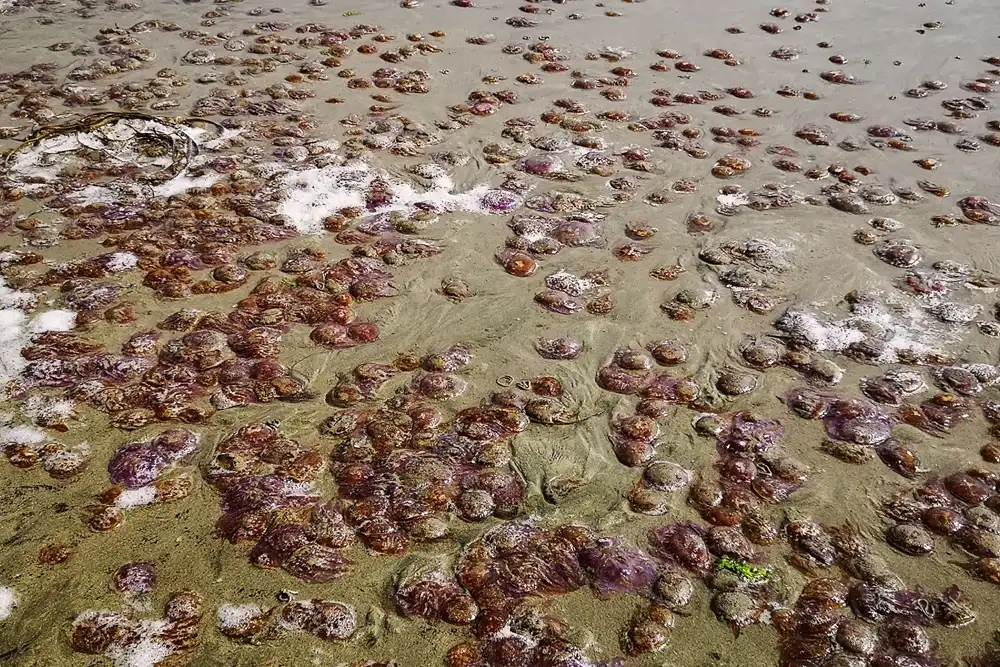
The Marine Conservation Society (MCS) has released its annual Wildlife Sightings report to mark World Jellyfish Day on Sunday, 3 November.
The wildlife sightings project gathers reports from UK and Irish waters of jellyfish and the turtles that feed on them, both of which are indicators of changes in the oceans over time, such as warming waters.
Moon jellyfish were the most commonly sighted during the collection period from 1 October 2023 to 30 September 2024, as compared to barrel jellyfish sightings being most numerous in 2023.
Compass jellyfish and Portuguese man o’ war sightings took joint-second spot with 280 sightings, but while that figure is to be expected for compass jellyfish, which are native to British and Irish waters, the figure for man o’ war sightings represents a fourfold increase over the 65 sightings logged in the 2022-2023 report.
Also known as ‘bluebottles’ in Australia, man o’ war (Physalia physalis) are not true jellyfish but siphonophores, made up of specialised colonies of individual organisms working together, rather than a single animal like jellyfish.
They are a pelagic species distributed mostly in the tropical and subtropical waters of the Atlantic and Pacific oceans, but are unable to swim, instead drifting with currents or being pushed by the wind. They were the most abundant species recorded by MCS volunteers between October 2023 and January 2024, driven by strong westerly winds during the winter months.
Related articles

Some research has suggested that an increase in some jellyfish and siphonophore numbers around the UK and Ireland could be related to rising sea temperatures caused by climate change, however, there currently isn’t enough evidence to make this link.
‘It’s really important to report jellyfish and turtle sightings, especially if it’s something unusual, so we can understand how our marine environment is changing,’ said Calum Duncan, Head of Policy and Advocacy at the Marine Conservation Society.
‘The rise in Portuguese man o’ war sightings in October may be attributed to strong westerly winds bringing them to our shores.
‘Historically, these creatures have not been prevalent in UK and Irish waters, so their increase could be related to shifts in our climate or alterations in the marine ecosystem.’
MCS also asks citizen science volunteers to submit sightings of marine turtles, for which jellyfish are a staple source of food.
This year, nine turtle sightings were reported, three of which were live leatherbacks (Dermochelys coriacea), which travel to British and Irish waters during June and July to feed on jellyfish.

Sadly, other sightings included three dead Kemp’s ridley turtles (Lepidochelys kempii) and two dead loggerhead turtles (Caretta caretta) reported during the winter months, with another remaining unidentified. Kemp’s ridley turtles are the rarest and most threatened of the seven turtle species and are currently listed as Critically Endangered on the IUCN Red List of Threatened Species.
Sightings of Kemp’s ridley turtles are usually juveniles blown off course by strong winds and currents. They are not suited to the UK and Ireland’s cold waters, and their frequency can be an indication of stormy weather.
The Marine Conservation Society works with other organisations to help rehabilitate stranded hard-shelled turtles where possible, that are often suffering from cold shock. The charity also has a Turtle Code which includes a turtle ID guide and what to do if a turtle is spotted on the shore. All turtle data is reported to the British & Irish Marine Turtle Strandings & Sightings Annual Report, which will next be released in Spring 2025.
Anybody who happens to be near the sea is encouraged to report jellyfish or turtle sightings via the MCS website at www.mcsuk.org/sightings.



